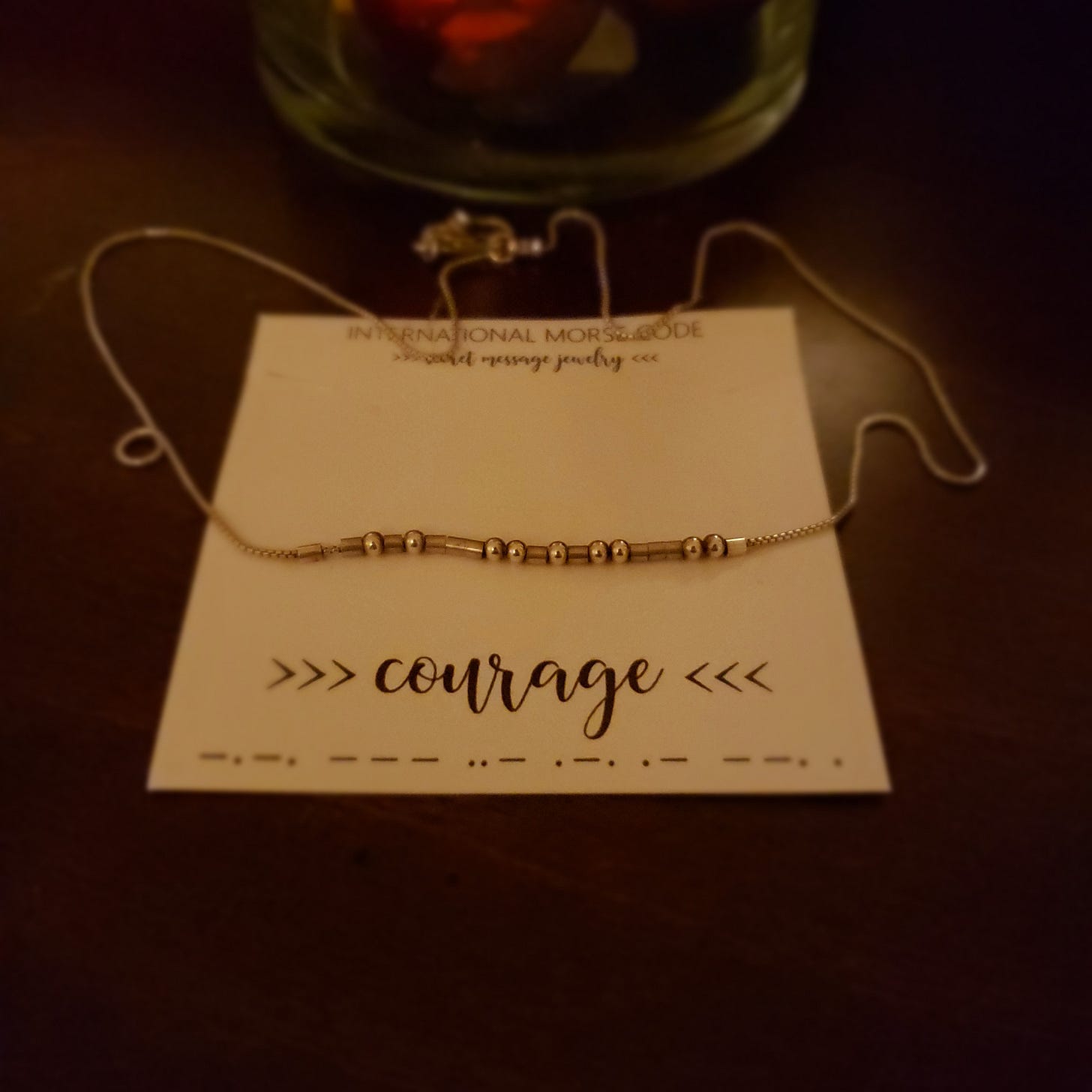Without courage we cannot practice any other virtue with consistency. We can’t be kind, true, merciful, generous, or honest.
- Maya Angelou
Courage is something that needs to be practiced and cultivated since it doesn’t come naturally for most of us. If you’re like me, it’s much easier to stay in a nice and cozy comfort zone rather than moving forward with courage. The thing is, though, I want to learn and grow, and I know that this won’t happen while I’m staying in my comfort zone. So becoming courageous, it is!
Several years ago I read The Gifts of Imperfection by Brené Brown, and courage is one of the primary tools she talks about for wholehearted living. As I read the book, I had the idea to write down some of the ways that I showed courage. I decided a bit on a whim (which is not typical for me) to buy a “One Line a Day” journal. This journal has a page for every day of the year, with spots on each page for 5 different years. So, I can look at “June 26” and see what I wrote on that day for each year. The way that I’ve decided to use this journal is to write down specific ways that I have practiced courage, compassion (including self-compassion), and/or connection.1 I’ve been using this journal for many years now, and looking back at my “courage” entries, I noticed I have often written about:
The courage to have hard conversations
The courage to set or maintain a boundary
The courage to affirm my own worth
The courage to take a next step
A while back, a friend of mine gave me a necklace that uses beads to spell out “Courage” in Morse code. I wore this necklace every day for roughly two years, and I still wear it often now. It’s a physical reminder of my commitment to cultivating courage.
I learned that I would need to practice courage in smaller, more private and personal ways, before I could demonstrate courage in larger, more public ways. Having hard conversations with people who I was fairly certain would be receptive to them was necessary to build my “courage muscle.” This built the strength I needed to have the hard conversations where I wasn’t sure how what I said would be received. I needed to process and talk through concepts that are often misunderstood with trusted colleagues first (at the risk of saying something inaccurate to them) before I was ready to explain challenging topics to a room full of people in a professional development session.
While it may be obvious, it’s worth saying that the thing that keeps us from choosing to practice and cultivate courage is fear. When I was growing up, I believed that courageous people had conquered fear and could be brave because they no longer felt afraid. Now I know that courageous people are those who choose to acknowledge and face their fear.
I’ve learned that there are five basic fears:
Fear of violation - when we sense our boundaries are being crossed
Fear of loss of control - when we feel helpless or vulnerable or might lose freedom; sometimes this manifests as a fear of intimacy
Fear of rejection - when we feel the potential of being vulnerable and are afraid that part or all of who we are will be unwanted
Fear of failure - when we feel the embarrassment, shame, disrespect, or disapproval of letting ourselves or others down; feeling unworthy of approval or love at our core
Fear of extinction - when we imagine that something in our life would cease to go on; fear of losing something precious to us, the permanence of an ending2
If we are able to name our fear(s), we are better equipped to step forward with courage. When I’ve felt the fear of violation, I can recognize that my boundaries are worth protecting, which helps me have the courage to communicate what I need (usually to protect my well-being). When I fear loss of control, I can look for the ways in which I can have a sense of agency.3 When I fear rejection or failure, I can lean on my own sense of inherent worth and dignity, even if other people do not share it. In naming the fear, I can lessen its power over me. This doesn’t mean that the fear isn’t still real and present, but it does mean that it’s not overwhelmingly loud, and I can more clearly see and decide how to practice courage.
In cultivating courage, I have become more fully myself while continuing to grow into the person I want to be.
In what ways do you (or do you want to) cultivate courage?
I’m excited for us to be able to learn from each other as I share what I’ve learned. It’s important that sharing and learning be welcoming and inclusive.
Expectations for comments:
Be curious
Be kind
Comments not aligning with these expectations will be deleted.
Specifically, Brown posits that courage, compassion, and connection are the tools for developing worthiness. She says, “Wholehearted living is about engaging in our lives from a place of worthiness.” I was wanting to deepen my sense of worthiness, so these three tools gave me the direction for what I wanted to intentionally develop in my life.
Brown, B. (2010). Introduction: Wholehearted Living. The Gifts of Imperfection: Let Go of Who You Think You’re Supposed to Be and Embrace Who You Are (pp.1-2). Hazelden Publishing.
Unice, N. (2021). Seek the Common Good. The Miracle Moment: How Tough Conversations Can Actually Transform Your Most Important Relationships (pp. 122-123). Tyndale Momentum.
I write more about how I’ve recently worked to find my own sense of agency in “Seeking Closure Part II: Finding A Sense of Agency.”






Love this ❤️